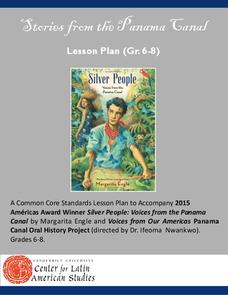Equality and Human Rights Commission
Taking Action
The Universal Declaration of Human Rights passed in 1948 when the majority of members of the United Nations voted in favor of the resolution. Scholars use their knowledge of human rights to determine ways they personally can help promote...
Equality and Human Rights Commission
Influencing Attitudes
Does propaganda—like that used during the first World War—exist today? The 11th lesson plan in a series of 12 highlights the role of media when it comes to influencing attitudes. Scholars learn about sensational headlines,...
Equality and Human Rights Commission
Balancing Human Rights
Everyone appreciates human rights, but what happens if the rights of an individual conflict with the rights of the larger group? Scholars explore real-life scenarios and debate when to limit rights and when to strictly enforce them. The...
Equality and Human Rights Commission
How Do Human Rights Work?
Do human rights apply to children? Scholars learn of three children asking for help to determine their rights and how to handle specific situations. Class members must research any laws pertaining to the requested right and how the...
Equality and Human Rights Commission
Discrimination
Discrimination takes many forms, and lesson eight in the 12-part series addresses many types and their greater impact on society. The lesson uses a presentation, videos, news stories, and discussions to synthesize many different viewpoints.
Equality and Human Rights Commission
Equality
Despite passing the Equality Act in 2010 covering many groups, gender inequality in Great Britain remains. Scholars investigate the concept of equality with a presentation, discussion, and hands-on timeline activities. The seventh lesson...
Equality and Human Rights Commission
What Are Human Rights
What if, rather than being entitle to human rights, basic human rights had to be purchased? With a fixed income, what rights would you buy? How much would you be willing to pay for a particular right? to gain an understanding of the...
Equality and Human Rights Commission
Negative Attitudes
A study in the United Kingdom found that approximately 60 percent of workers had heard the term gay used as an insult in the professional workplace. Scholars consider discrimination, negative attitudes, tolerance, and stereotypes in the...
Judicial Learning Center
The Bill of Rights and Civil Liberties
Why is the Bill of Rights so important to American's civil liberties? An important resource helps scholars find these answers and more by reading through state and federal constitutions to discover their own civil liberties. The activity...
Judicial Learning Center
Do You Know Your Bill of Rights?
The Bill of Rights is much more than an important piece of paper! The rights cover everything from freedom of speech to the right to remain silent if arrested. Scholars find out their own rights by answering the questions in the form of...
Judicial Learning Center
Article III WebQuest
Why is Article III of the constitution so significant? Pupils discover the importance of Article III and how it relates to past as well as current events by completing Internet research using a provided handout. They learn everything...
Vanderbilt University
Stories from the Panama Canal
The stories of the Silver People, the West Indies immigrants hired to work on the Panama Canal, come to life in a lesson about the building of the Panama Canal. Groups research why the canal was built, how it was build, the working...
Children's Commissioner for Wales
Know Your Rights!
Children around the world enjoy a list of rights that protect their bodies, minds, families, and lifestyles. Review the United Nations Convention on the Rights of the Child with learners of all ages, and teach them all about their rights.
Curated OER
Turning Assets into Action in the Fight Against Hunger
How can one person change the world? Scholars research and analyze the topic of world hunger. Using video clips, parodies, and primary source evidence, they uncover a current campaign to end world hunger. Collaborative groups openly...
Institute for Humane Education
Where Are the People like Me?
Are some characteristics more desired than others?Scholars examine attributes of characters in books, models in catalogs, and articles in magazines. Discussion leads to identifying characteristics they see more often as well as...
Little Kids Rock
The Influence of Latin Music in Postwar New York City
Music has often been called the international language that transcends cultures and regions. Scholars analyze the impact of Latin American music on New York City culture in the years following World War II. They research music, video,...
National Endowment for the Humanities
The "To Do List" of the Continental Congress
What is on your to-do list today? The second lesson of a three-part series on Lost Heroes of America investigates the laundry list of items in front of the second Continental Congress. Scholars research, analyze, and present information...
Education Fund
Fear the Scarce Resources
In a life or death situation, what resources would you choose to survive—and why? A zombie attack simulation teaches learners the concepts of scarcity and resources in regards to economics. The hands-on activity requires individuals to...
Smithsonian Institution
Dia de los Muertos: Honoring our Ancestors Through Community Celebration
Oral storytelling has been an important part of every culture. The time-honored practice uses stories as a conduit for a culture's values and customs from one generation to the next. Keep the tradition going with a family interview...
Institute for Humane Education
I've Been Branded!
How many pairs of Nikes® or Apple® products are in the average American home? What makes someone buy one particular type of laundry detergent over another? Scholars grapple with these questions as they develop a list of brands they use...
Annenberg Foundation
Native Voices
The Navajo people build their dwellings with the doors facing the rising sun in the east to welcome wealth and fortune. Pupils learn about the traditions of the Navajo people in the first part of a 16-part unit. They explore American...
Thalian Association Community Theatre
West Side Story: Teacher Resource Guide
West Side Story is widely known as a modern-day Romeo & Juliet. Learners read a list of characters from the play and list their counterparts from Romeo & Juliet before completing a vocabulary enrichment activity and word jumble....
Council for the Curriculum, Examinations and Assessment
Victorian Historians
Take the class back in time to the Victorian Era! The resource provides a plethora of activities that create experiences for scholars in class. Some activities include a fun fair, viewing the starry-night painting, and even experiencing...
Mr. Nussbaum
Battle of Fort Sumter
Fort Sumter, the site of the Civil War's first battle, taught the Union and the Confederacy an important lesson: they would both need to take stronger steps than anticipated if they wanted to win the war. History pupils read about the...

























